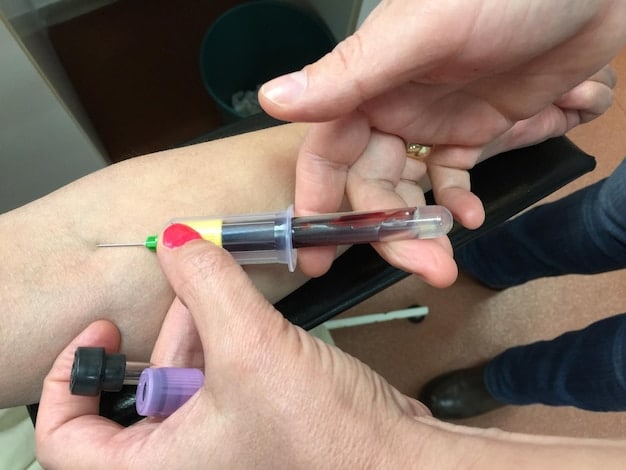Interpret Your Blood Test: A Comprehensive Guide to Health Markers

Understanding your blood test results can be empowering, offering insights into your overall health and potential areas for improvement. This guide helps you decipher key health markers, empowering you to have informed conversations with your healthcare provider about your well-being.
Have you ever received a blood test report and felt completely lost in the sea of numbers and unfamiliar terms? Learning **how to interpret your blood test results: a comprehensive guide to understanding key health markers** can empower you to take a more active role in your healthcare journey. This guide aims to demystify the process, providing you with the knowledge to understand what your blood is telling you.
Understanding the Basics of Blood Tests
Blood tests are a routine yet crucial part of healthcare, offering a snapshot of your body’s current state. They help doctors diagnose illnesses, assess organ function, and monitor the effectiveness of treatments. Before diving into the specific markers, it’s essential to understand why these tests are performed and what they can reveal.
Understanding the different types of blood tests and what they measure is the first step in interpreting your results. Let’s explore some common categories:
Complete Blood Count (CBC)
The CBC is one of the most common blood tests, providing information about the different types of cells in your blood. This includes red blood cells, white blood cells, and platelets, which each play a vital role in your overall health.
Comprehensive Metabolic Panel (CMP)
The CMP provides information about your body’s chemical balance and metabolism. It measures several different substances in your blood, including electrolytes, glucose, kidney function markers, and liver function markers.
- Red Blood Cells (RBCs): Carry oxygen throughout the body. Abnormal levels can indicate anemia or other health issues.
- White Blood Cells (WBCs): Fight infection. Elevated levels may suggest an infection or inflammation.
- Platelets: Help with blood clotting. Low levels can lead to excessive bleeding, while high levels can increase the risk of blood clots.
- Electrolytes: Such as sodium, potassium, and chloride, help regulate fluid balance and nerve and muscle function.
Knowing the basics of blood tests empowers you to engage in more informed discussions with your healthcare provider, leading to better health outcomes.

Key Health Markers and What They Mean
Each marker in a blood test provides specific information about your health. Learning to recognize these markers and understanding their normal ranges is key to interpreting your results effectively. Let’s delve into some of the most important markers to watch out for:
These markers offer insights into various aspects of your health, from cholesterol levels to thyroid function. Here are some of the vital health parameters:
Cholesterol Levels
Cholesterol is a type of fat in your blood that is essential for building healthy cells. However, high levels of cholesterol can increase your risk of heart disease. A lipid panel measures different types of cholesterol, including LDL (“bad”) cholesterol, HDL (“good”) cholesterol, and triglycerides.
Blood Glucose
Blood glucose, or blood sugar, is the amount of glucose in your blood. It’s a primary source of energy for your body. Abnormal glucose levels can indicate diabetes or pre-diabetes.
- LDL Cholesterol: High levels can lead to plaque buildup in arteries, increasing heart disease risk.
- HDL Cholesterol: Helps remove LDL cholesterol from the arteries, protecting against heart disease.
- Triglycerides: Another type of fat in the blood. High levels, especially with low HDL or high LDL, can increase heart disease risk.
- Glucose: Elevated fasting blood glucose can indicate diabetes.
Understanding these key health markers enables you to proactively monitor your health and work with your doctor to manage any potential issues.
Understanding Normal Ranges
Normal ranges for blood test markers vary depending on the laboratory, age, sex, and other factors. Your lab report will typically provide the reference range for each marker. However, understanding what these ranges mean in the context of your overall health is crucial.
Reference ranges can sometimes feel confusing, but they are a critical tool for assessing your health status. Here’s what you should consider:
Factors Affecting Normal Ranges
Normal ranges are established by testing a large number of healthy individuals and finding the values that fall within the typical spectrum. However, these ranges are not absolute and can be influenced by various factors, including age, sex, and lifestyle.
What to Do if Your Results Are Outside the Normal Range
If your blood test results fall outside the normal range, it doesn’t necessarily mean you have a serious health problem. Many factors can cause temporary fluctuations in blood test markers. However, it’s essential to discuss any abnormal results with your healthcare provider. They can help you understand the significance of the findings and recommend any necessary follow-up tests or treatments.
- Age and Sex: Normal ranges often vary, particularly for hormones and certain enzymes.
- Lifestyle Factors: Diet, exercise, and smoking can influence blood test results.
- Lab Variations: Different labs may use different methods, leading to slight variations in reference ranges.
- Medications: Certain medications can affect blood test results.
Understanding the nuances of normal ranges and what factors can influence them helps ensure a more accurate interpretation of your blood test results and allows for more informed healthcare decisions.

Common Blood Test Panels and Their Significance
Blood tests are often grouped into panels to provide a comprehensive overview of various aspects of your health. Each panel focuses on specific markers and can help diagnose or monitor different conditions. Knowing what these panels include and what they can reveal can help you better understand your health.
These panels are designed to give healthcare providers a broad view of your health. Let’s examine some common panels:
Lipid Panel
As mentioned earlier, a lipid panel measures cholesterol levels and is used to assess your risk of heart disease. It typically includes total cholesterol, LDL cholesterol, HDL cholesterol, and triglycerides.
Thyroid Panel
A thyroid panel measures thyroid hormone levels and is used to diagnose and monitor thyroid disorders, such as hypothyroidism (underactive thyroid) and hyperthyroidism (overactive thyroid).
- Comprehensive Metabolic Panel (CMP): Provides a broad assessment of kidney and liver function, electrolyte balance, and blood sugar levels.
- Complete Blood Count (CBC): Assesses blood cell counts to detect infections, anemia, and other blood disorders.
- Liver Function Test (LFT): Evaluates liver health by measuring levels of liver enzymes and proteins.
- Kidney Function Test (KFT): Assesses kidney health by measuring levels of creatinine and blood urea nitrogen (BUN).
Recognizing these common blood test panels enables you to better understand the purpose of each test and the information it provides about your health.
Factors That Can Affect Blood Test Results
Numerous factors can influence your blood test results, including diet, medications, and lifestyle choices. It’s essential to be aware of these factors to ensure accurate interpretation of your results. Prepare for your blood tests by understanding which factors might affect blood tests.
Being mindful of these influences can help you and your doctor make informed decisions about your health. Consider these factors:
Diet and Hydration
What you eat and drink in the days leading up to your blood test can impact certain markers, such as glucose and cholesterol. Additionally, dehydration can affect blood volume and electrolyte levels.
Medications and Supplements
Many medications and supplements can interfere with blood test results. Be sure to inform your healthcare provider about all the medications and supplements you are taking prior to your test.
- Fasting: Some tests require fasting for 8-12 hours, which can significantly affect glucose and lipid levels if not followed.
- Alcohol Consumption: Can elevate liver enzymes and triglyceride levels.
- Exercise: Strenuous exercise can temporarily increase certain muscle enzymes in the blood.
- Time of Day: Hormone levels, such as cortisol, can vary throughout the day.
By being aware of the factors that can affect blood test results, you can take steps to minimize their impact and ensure more accurate readings.
Taking Action Based on Your Blood Test Results
Once you have your blood test results, it’s time to take action. This may involve lifestyle changes, medication adjustments, or further testing. It’s crucial to work closely with your healthcare provider to develop a plan that’s right for you.
Taking informed action ensures you’re proactively managing your health. Consider these steps:
Consult with Your Healthcare Provider
Your healthcare provider is the best resource for interpreting your blood test results and developing a personalized treatment plan. They can explain the significance of any abnormal findings and recommend appropriate follow-up steps.
Lifestyle Changes
In many cases, lifestyle changes such as diet, exercise, and stress management can help improve blood test markers. For example, eating a healthy diet and exercising regularly can lower cholesterol levels and improve blood glucose control.
- Follow-Up Testing: Your doctor may recommend additional tests to confirm or further investigate abnormal results.
- Medication Adjustments: If you are taking medications that are affecting your blood test results, your doctor may adjust the dosage or switch to a different medication.
- Regular Monitoring: Depending on your health status, your doctor may recommend regular blood tests to monitor your progress and ensure that your treatment plan is effective.
- Dietary Changes: Cutting back on processed foods, sugary drinks, and unhealthy fats can improve many health markers.
By taking appropriate action based on your blood test results, you can proactively manage your health and prevent or delay the onset of chronic diseases. This approach promotes greater well-being and a healthier future.
| Key Point | Brief Description |
|---|---|
| 🩸 CBC | Evaluates the types and numbers of cells in your blood. |
| 🩺 CMP | Assesses kidney and liver function, plus electrolyte balance. |
| ❤️ Lipid Panel | Measures cholesterol levels for heart disease risk assessment. |
| 🧪 Factors | Diet, meds, and lifestyle choice impacts test results. |
Frequently Asked Questions (FAQ)
A complete blood count (CBC) is a blood test used to evaluate the overall health. The CBC test measures the types and numbers of blood cells in the body, including red blood cells, white blood cells, and platelets.
A high white blood cell count, also known as leukocytosis, typically indicates that your body is fighting off an infection, inflammation, or some other type of immune response. Further testing may be needed.
The frequency of blood tests depends on individual health needs, risk factors, and medical conditions. Generally, healthy adults should have a blood test as part of their annual physical exam. Consult your healthcare provider.
It depends on the blood test. Some tests require fasting, which means you should not eat or drink anything (except water) for 8-12 hours before the test. Always follow your doctor’s specific instructions.
For most adults, normal fasting blood glucose levels are between 70 and 99 mg/dL. Levels between 100 and 125 mg/dL may indicate prediabetes. A level of 126 mg/dL or higher indicates diabetes.
Conclusion
Understanding **how to interpret your blood test results: a comprehensive guide to understanding key health markers** empowers you to take control of your health journey. By familiarizing yourself with common blood tests, key health markers, their normal ranges, and the factors that can affect results, you can engage in more informed discussions with your healthcare provider and make proactive decisions to optimize your well-being.





